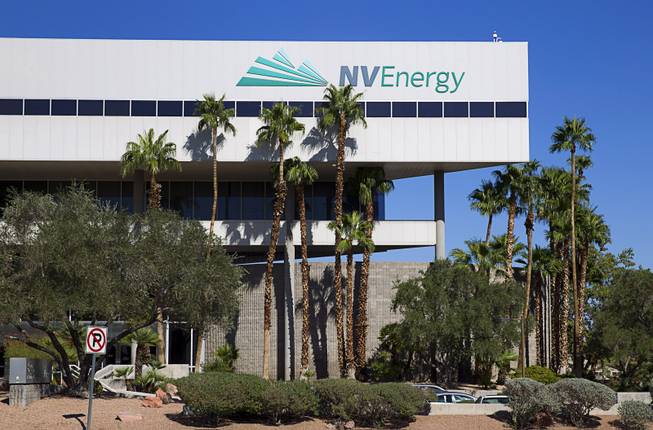Wednesday, Aug. 17, 2016 | 2 a.m.
NV Energy reaffirmed its plans Tuesday to remain neutral on a ballot measure that would start a multiyear process of ending the company’s regulated monopoly on supplying electricity. Later in the day, organized labor confirmed plans to oppose the measure, while Sen. Harry Reid voiced his support.
The ballot measure known as the Energy Choice Initiative, with financial support from Nevada gaming and technology companies, would create a competitive retail energy market in which customers would be able to buy electricity from suppliers other than NV Energy. Under the language of the measure, a proposed constitutional amendment, NV Energy could continue operating the grid, handling transmission and distribution for suppliers.
Las Vegas Sands Corp., MGM Resorts International and Las Vegas-based data company Switch Ltd. have contributed to the political action committee behind the measure. When the PAC was first unveiled this year, Las Vegas Sands was the largest funder with a contribution of at least $675,000.
The effort has also received nods from Tesla Motors and most recently, from Reid, who expressed support for it on Tuesday, saying in a statement that “Nevadans should have the freedom to decide who supplies their electricity and whether to generate it with their own renewable energy system.”
For months, there has been no organized push against the Energy Choice Initiative, and the Secretary of State’s Office had even appointed an attorney to write the opposing argument that would appear on the ballot.
That is expected to change in the coming weeks as organized labor gets involved. Danny Thompson, executive secretary treasurer of the Nevada State AFL-CIO, said his organization is opposed to deregulation and will form a PAC to actively campaign against its approval in November.
“We are opposed to deregulation,” he said Tuesday evening, arguing that creating a competitive market could cause rate hikes for residential consumers. “We represent over 200,000 people whose bills will be impacted.”
Although NV Energy will not take a position on the measure, it wants to help guide the debate. The utility issued eight “key principles” on Tuesday to help inform the arguments around restructuring Nevada’s energy market. They range from recognizing demand for cleaner energy to ensuring that NV Energy and its current suppliers are not left without the ability to recoup billions in long-term investments.
“I’m not pushing (voters) in any given direction,” NV Energy’s CEO Paul Caudill said in an interview on Tuesday. “What we’re trying to do is put information out there that people should think about.”
The process for restructuring an energy market is complicated, and Caudill said that the goal of the principles is to help organize the debate, as policymakers will be forced to reckon with complicated questions. The initiative gives the Legislature considerable leeway on how to implement restructuring. When many states deregulate, they require the incumbent utility to divest of its power plants, keeping only its transmission services.
“If that’s where the state is headed, NV Energy would likely end up being what we call a wires company,” Caudill said. “It would have responsibility for transmission and distribution.”
The principles also urge the energy-choice campaign to ensure that restructuring does not give new energy suppliers an unfair advantage in complying with state standards, from consumer protection to renewable portfolio requirements.
Several states have created competitive markets and some states, including Nevada, have flirted with the idea in the past. Depending on its implementation, residential customers could benefit from competition driving down rates and choices about where to buy power. At the same time, the move can be risky, potentially exposing customers more directly to market pressures that might hike rates.
Those in favor of restructuring argue that an open energy market encourages investment in renewable resources. In March, when Tesla announced its support for the ballot measure in Nevada, CEO Elon Musk said in a statement that “‘Energy Choice’ will enable Tesla and all Nevadans to choose solar.”
Proponents and opponents alike point to Texas as an example of where deregulation has both erred and has succeeded. The state implemented a deregulation law in 2002 but exempted some areas of the state.
The Texas Coalition for Affordable Power released a report in June showing that average residential prices are higher in deregulated areas of Texas than in the regulated areas that include Austin and San Antonio. But the same report shows that in deregulated markets, such as Dallas, nearly half of all retail suppliers are offering more affordable individual deals than the average energy rates in regulated areas of Texas.
Nevada started the process of establishing an open market in the late 1990s, amid a wave of states considering deregulation. But it abandoned the process after seeing instability in California’s partially deregulated market. That crisis was largely driven by energy supply issues and market manipulation from firms like Enron.
But Thompson said that experience is one reason the union opposes the campaign.
“If enacted, this sort of policy would inevitably result in significant layoffs at NV Energy, and could open the door to large-scale Enron-style deregulation of the energy industry in Nevada,” a union organizer from IBEW 1245, which represents electrical workers, wrote in a February blog post urging members not to support the initiative.
A number of states have deregulated markets without the issues California faced. Proponents also say that deregulation will be more effective because of new technologies, such as smart meters, that could push rates lower by allowing competitive retail suppliers to offer low-priced deals to their customers.
As a constitutional amendment, voters would have to approve the Energy Choice Initiative twice. By 2023, the Legislature would have to create a law opening up Nevada’s market, if the measure is successful.


Join the Discussion:
Check this out for a full explanation of our conversion to the LiveFyre commenting system and instructions on how to sign up for an account.
Full comments policy